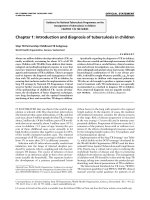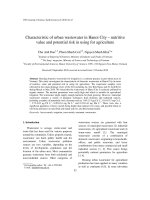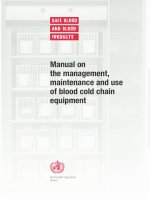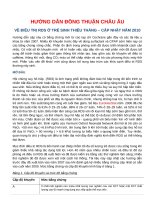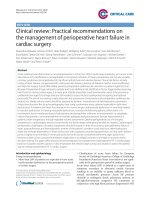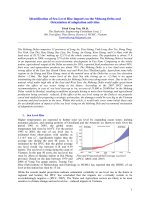Level of autonomy on the management of vocational schools () in hanoi city, vietnam
Bạn đang xem bản rút gọn của tài liệu. Xem và tải ngay bản đầy đủ của tài liệu tại đây (351.41 KB, 18 trang )
THAI NGUYEN UNIVERSITY
Socialist Republic of Vietnam
SOUTHERN LUZON STATE UNIVERSITY
Republic of the Philippines
LEVEL OF AUTONOMY ON THE MANAGEMENT
OF VOCATIONAL SCHOOLS IN HANOI CITY, VIETNAM
A RESEARCH PROPOSAL PRESENTED TO THE FACULTY OF GRADUATE SCHOOL
SOUTHERN LUZON STATE UNIVERSITY LUCBAN, QUEZON, PHILIPPINES
THAI NGUYEN UNIVERSITY S.R. VIETNAM
IN PARTIAL FULFILLMENT OF THE REQUIREMENTS FOR THE DEGREE
DOCTORS IN BUSINESS ADMINISTRATION
Phạm Quang Vinh (Stone)
Hanoi, 2013
CHAPTER I
THE PROBLEM AND ITS SETTING
Introduction
Autonomy of institutions in the field of education is understood as selfdetermination and self-responsibility under the laws and the requirements of society for all
its activities such as finance, personnel and organizational structure, training programs,
strategic planning, etc...
Autonomy does not mean relinquishing management from the state. In contrast,
autonomy given to schools is considered as one of the most important solutions to bring
motivations, new life for training institutions to improve the efficiency, educational quality
and social responsibility of the schools.
Vietnam is in the process of institutional transformation from the planning bureaucracy - subsidy economy to the market economy completely. Accordingly, education
and training is not only seen as a public utility sector, but also considered an important
service sector that has been contributing significantly to the sustainable development of
market economy.
Background of the study
The developments towards a different model of governance in many advanced
societies have been characterized with the phrase “regulatory state” (Moran 2002), i.e. a
state where direct public ownerships is replaced by regulating more autonomous units. As a
general rule, vocation schools have become more autonomous – free from line-itemized
budgets, input control, and detailed prescriptions on curricula (Santiago et al. 2008). The
greater autonomy is at the same time balanced by new accountability mechanisms
(Santiago et al. 2008). Therefore, the autonomy of the schools is limited to make the
selection of the training majors as well as to determine the suitable training model upon
requests of the labour markets and training capacities of schools actively.
At present, Vietnam doesn’t have enough the particular laws to encourage the
enterprises and schools to “shake hands/ cooperate” closely so as to train students to meet
the demands of the labour market. Schools still train students with their own programs
without being concerned much about what the labour market requires. The stagnations, the
inactiveness of the schools are affected directly by the management methods, which are
lack of the motivation and exist the bureaucracies of the managers and leaders.
4
Currently, autonomy is inevitable trend of the policy orientation in the development
of education and occupational education sector in Vietnam. Autonomy can be considered
as a key tool to reform and revive the occupational education system in Vietnam.
This research will also mention some experiences in developing the occupational
education policies in some advanced countries. Based on that, this study will give out
useful lessons to develop the policy framework of occupational education sector in
Vietnam.
Statement of the Problem
•
The basic information exploited from the interviewees under the angles of:
− Ages
− Qualifications
− Job positions
− Gender
− Working experiences in education & training field.
•
What is the existing level of autonomy on management of Vocation schools in
Hanoi city, Vietnam in items of:
− Organizational autonomy
− Financial autonomy
− Staffing autonomy
− Academic autonomy
•
Which of the autonomy factors were enjoined much or least of the vocational
schools as perceived by respondents?
•
What should be the extent of autonomy on the given indicators that may be
spelled out by Private and Public vocational schools?
•
What plan program can be developed to support the autonomy to develop
professional education institutions?
Hypotheses
There is no significant different on perceived autonomy by group of respondent and their
profile.
5
CHAPTER 2
REVIEW OF RELATED LITERATUES AND STUDIES
This chapter will present concepts and theories that have significant effects on the
conduct of the study. Review of related literatures and study will present what had been
written about the subject. Finally a Conceptual framework that will aid the conduct of this
research work will be established.
Concept on Education and Vocational school
•
Occupational education (education based on occupation or employment, also
known as Technical Vocational Education and Training - TVET) is education
that prepares people for specific trades, crafts and careers at various levels from
a trade,
a craft, technician,
or
a
professional
position
in engineering,
accountancy, nursing, medicine, architecture, pharmacy, law etc. In Vietnam,
Occupational education sector is a system that includes professional secondary
schools, vocational schools, vocational colleges and other vocational
institutions.
•
Vocational school (or trade school, or career school), providing vocational
education, is a school in which students are taught the skills needed to perform a
particular job. Traditionally, vocational schools have not existed to
further education in the area of liberal arts, but rather to teach only job-specific
skills, and as such have been better considered to be institutions devoted to
training, and not liberal arts education. In the the scope of this dissertation,
concept of vocational school in Vietnam is meant to be a institution of
Occupational Education System.
The problems of autonomy and autonomy schools
•
Autonomy: Autonomy is an importance content of in the field of organizational
management (de Boer, 2010; Jongboed, 2010). It is understood that the right to
making-decisions its-self of an organization. Of course, autonomy must be tied
to their accountability for the consequences of this decision with the authorities,
their stakeholders and the community.
•
Effective autonomy: Autonomy can make the environment necessary for the
proper functioning of the Autonomy -Assessment - Accountability framework.
6
To work properly, autonomy of the school must have political support at the
central and local levels, it should have a legal framework that allows autonomy
to function unimpeded, and should have the assent of teachers. If teachers are
not in agreement what happens in the classroom will be very different from
what autonomy intended (Arcia, Porta, and Laguna, 2004).
•
School autonomy:
As the report by the Committee on Autonomy and accountability of
higher education establishments of the Central Advisory Committee on Indian
Education (2005), autonomy is understood as a system of regulations on the
decentralization in decision making of the superior to the subordinates to
encourage their creativeness and activeness in order to obtain the higher
efficiency in management.
School autonomy is a form of school management in which schools are
given decision-making authority over their operations, including the hiring and
firing of personnel, and the assessment of teachers and pedagogical practices.
School management under autonomy may give an important role to the School
Council - representing the interests of parents - in budget planning and approval,
as well as a voice/vote in personnel decisions. By including the School Council
in school management, school autonomy fosters accountability (Di Gropello
2004, 2006; Barrera, Fasih and Patrinos, 2009).
The studies of Thomas Estermann, Terhi Nokkala & Monika Steinel
(2010) gave out the dimension of school autonomy with four factors and its
criteria in Table 2.2.
Other studies of Estermann & Nokkala (2009), Thomas Estermann
(2011), Yu-Ling Hsu Flora (2012) and sources from Eurydice (2007) pointed
out the specific contents for each criteria that are described in Table 2.2. The
specific contents of this description are also shown in Appendix A:
Questionnaire Checklist of this study.
7
Table 2.2: Dimension of School autonomy
Overview on status of education system and school autonomy in Vietnam
•
Structure of Vietnam education system and its actives: It presented in this
dissertation (page 34 – 37).
•
Occupational Education Institutions: It shown the history of establishment and
development of the occupational education institution in Vietnam from French
colonialism period to now.
•
School Autonomy in Vietnam: Presenting of the basic contents of Decree No.
43/2006/ND-CP, dated 25/4/2006 of the Government, identified autonomy, selfresponsibility for tasks, organizational arrangements, staffing and financing of
public schools at three levels: (i) self ensure all of operating costs: the school
has revenue greater than or equal to the regular operating costs; self-ensure all
of regular costs for their activities; (ii) self-ensure a part of the cost of operating:
school have income to self-ensure from 10% to less than 100% of the cost of
regular operating, the rest are allocated by the state budget (iii) depends entirely
on the state budget: income of the school is less than 10% of the cost of regular
operating, or no income; all of regular operating cost will be ensure by the state
budget.
Related studies (It is presented detail in dissertation)
8
Conceptual framework
Figure 2.6. Research model for assessment of level of autonomy on the management of
vocation schools in Hanoi, Vietnam
Independent Variables
Dependent Variable
Organisational
autonomy
Financial
autonomy
School
Autonomy
Staffing
LIBERATING
OF SCHOOL
ACTIVITIES
autonomy
Academic
autonomy
AUTONOMY
MOTIVATIONS
ACTIVITIES
9
CHAPTER 3
RESEARCH METHODOLOGY
Research Design
This study was designed primarily to use the tools and methods of quantitative
analysis to evaluate the autonomy practices in vocation school in Hanoi city and propose
innovative solutions for the improving managing autonomy in those Vocation schools.
Subject of the study
It includes public school and private school in Hanoi city, Vietnam. In which 184
managers whose is member of managing school and 355 respondents are teacher or
lecturers who teaching at those vocation schools. Their responses on the existing level of
autonomy on management of Vocation schools were evaluated, as well as the encountered
problems (difficulties). Recommendations to support the autonomy to develop professional
education in vocation school were identified to solve the problems.
Statistical treatment
Some qualitative and quantitative criteria such as: gender, age, department,
position, working experiences which was processed through frequency or distributed
percentage. The table 3.3 below shows that the needed data and the treatment required
processing it.
Table 3.3. Type of data and methods of gathering and processing
Items
I. Profile of respondents
II. Respondents’ perception
Methodology
Data
Frequency Count, Percentage
Survey
Weighted Mean, ranking
Survey
ANOVA – one way
Survey
Description
Survey
III. The different on perceived
autonomy by group of
respondent and their profile.
IV. Difficulties encountered in
the autonomy actives in
vocation school in Hanoi city
10
CHAPTER 4
PRESENTATION ANALYSIS AND INTERPRETATION OF DATA
In this chapter gathered data were presented, analyzed and interpreted in order to
answer the problems and sub problems posted in this research.
Assessment of the respondents on the existing level of autonomy on management of
Vocation schools in Hanoi city
Table 4.2.3: The existing level of autonomy on management of Vocation schools
in Hanoi city in terms of Identifying of Organizational autonomy
Indicators
1. Selection procedure for the executive
head
2. Selection criteria for the executive head
3. Dismissal of the executive head
4. Term of office of the executive head
5. External members in school governing
bodies
6. Capacity to decide on academic
structures
7.Capacity to create legal entities
Average
Public
vocation
schools
Mean VI
Private
vocation
schools
Mean VI
Over-all
Mean
VI
2.96
AV
2.82
AV
2.89
AV
3.12
2.86
3.29
AV
AV
AV
3.05
2.62
3.31
AV
AV
AV
3.09
2.74
3.3
AV
AV
AV
3.09
AV
3.08
AV
3.09
AV
3.25
AV
3.15
AV
3.2
AV
3.4
3.09
HI
AV
3.3
3
AV
AV
3.35
3.05
AV
AV
The autonomy of institutions of vocational training schools in Hanoi are evaluated
at the average, many criteria are undervalued. This shows that there are many limitations in
expanding democracy, strengthening accountability and autonomy of the organizational
structure of schools. This problems should be overcome. Specifically: Review both of the
external and internal of the schools to select their managers; Strengthening the role of the
school in the making-decision processing to appoint or dismiss their managers;
Appointment or dismissal of managers based on the capacity, quality and efficiency of their
operating; Upgrade the role of School Councils and additional external members on the
Managing Board; Empower the schools to decide the academic structure and enhance their
accountability ; Innovate the system regulations to allow the schools establish their legal
entities.
11
Table 4.2.6:
Mean Distribution of Responses on the existing level of autonomy on management of
Vocational schools in Hanoi in terms of to Identifying of Financial autonomy
Indicators
1.Length and type of public funding
2.Ability to keep surplus
3.Ability to borrow money
4.Ability to own buildings
5.Ability to charge tuition Fees
Average
Public
vocation
schools
Mean
VI
Private
vocation
schools
Mean VI
Mean
VI
2.84
2.90
3.09
2.91
3.01
2.95
3.04
2.98
3.07
2.75
2.94
2.95
2.94
2.94
3.08
2.84
2.98
2.95
AV
AV
AV
AV
AV
AV
AV
AV
AV
AV
AV
AV
AV
AV
AV
AV
AV
AV
Over-all
Sum up assessment of financial autonomy of vocational schools in Hanoi, both
groups of respondents agreed that the indicators of financial autonomy did not meet the
their wishes, there are many content needs to improve. The State have had new policies that
aim to promote financial autonomy of the schools. But it exist the complex regulations and
unreasonable management policies. Awareness of managers about financial autonomy in
the vocational schools is still limited. They do not really understand how to effectively use
financial autonomy to develop their schools. Therefore, the implementation of the financial
autonomy of vocational schools in Hanoi was not successful.
Table 4.2.9: Mean Distribution of Responses on the existing level of autonomy on
management of Vocational schools in Hanoi in terms of to Identifying of Staffing autonomy
Indicators
1. Capacity to decide on recruitment
procedures (senior academic/senior
administrative staff)
2. Capacity to decide on salaries
(senior academic/senior administrative
staff)
3. Capacity to decide on dismissals
(senior academic/senior administrative
staff)
4.Capacity to decide on promotions
(senior academic/senior administrative
staff)
Average
Public
vocation
schools
Mean VI
Private
vocation
schools
Mean VI
Over-all
Mean
VI
3.06
AV
2.86
AV
2.96
AV
2.98
AV
2.8
AV
2.9
AV
3.115
AV
3.12
AV
3.12
AV
2.67
AV
2.76
AV
2.72
AV
3.07
AV
2.95
AV
3.01
AV
12
Staffing autonomy in vocational schools in Hanoi is only a inadequate level, not
really effective. Most of the criteria set out respondents rated at average. It shows that there
are several problems, such as: Rigid rules of state agencies in the recruitment, appointment
and dismissal of personnel; Salary policy in the schools dependent the salaries system of
the State, it should not create positive incentives for managers and teachers; Lack of
specific regulations for job titles, it lead to difficult to assess the quality and effectiveness
of staff's working.
Table 4.2.12
Composite of Mean Distribution of Responses on the existing level of autonomy on
management of Vocational schools in Hanoi city in terms of to Identifying of Academic
Indicators
1.Capacity to decide on overall student
numbers
2.Capacity to select students
3.Capacity to introduce and terminate
degree programmers
4.Capacity to select quality
assurance mechanisms and providers
5. Capacity to design content of degree
programmers
Average
Public
vocation
schools
Mean VI
Private
vocation
Over-all
schools
Mean VI Mean VI
3.03
AV
2.95
AV
3
AV
2.59
LO
2.57
LO
2.58
LO
3.09
AV
3
AV
3.05
AV
2.76
AV
2.62
AV
2.69
AV
2.54
LO
2.41
LO
2.48
LO
2.92
AV
2.85
AV
2.89
AV
Academic autonomy is an important factor in school's autonomy. However, both of
two groups (public and private schools) are not highly evaluated the criteria in this content,
even some criteria was evaluated very low. It shown that: the authority is still a person who
decided number of students to recruit every year of the schools; Most of vocational schools
in Hanoi are struggling in enrollment due to competition as well as the inadequacies in the
system of state management of vocational training, so they do not have many opportunities
to choose students; Quality assurance system in the vocational schools in Hanoi is quite
outdated and inefficient. Most of vocational schools in Hanoi have not successfully to built
good quality assurance mechanism; The regulations in building training program is rigid,
and the schools lack of experts and resources to build training programs to meet the needs
of labor market.
13
Assessment of the importance of autonomy factors in vocation schools
The general assessment of the importance of the active content of autonomy at the
vocational school in Hanoi, the result was presented in table 4.3.5
Table 4.3.5: Composite off Mean Distribution of Responses on the importance
of autonomy factors in vocation schools in Hanoi city
Over-all
Indicators
Mean
VI
Rank
•
Organization autonomy
3.21
AV
2
•
Financial autonomy
3.48
HI
1
•
Staffing autonomy
3.16
AV
4
•
Academic autonomy
3.18
AV
3
3.26
AV
Average
Factors should be the extent of autonomy on the given indicators that may be spelled
out by Private and Public vocational schools.
The vocational school in Hanoi should add more the following item to the operation
of the school in order to turn as (1) Collaboration with schools, the offices and other
informal, (2) Local authorities control the opening of new schools or consolidation of the
schools., and last is (3) The power of the State management agency by the law with the
schools.
Significant Differences Between the Respondent’s Profiles and Perception on the level
of autonomy on management of Vocation schools in Hanoi city.
There is significant in relation between respondent’s working position and their
perception on school autonomy in item of Organization autonomy (both of public and private
schools).
In the public schools, there is significant in relation between respondent’s working
division and their perception on school autonomy in item of Organization autonomy. And in the
private schools, there is significant in relation between respondent’s working division and their
perception on school autonomy in item of Financial autonomy.
14
CHAPTER 5
FINDINGS, CONCLUSIONS AND RECOMMENDATIONS
Summary
This research used a combined methodology of both quantitative and qualitative
approaches were applied to get a general understanding of the level of autonomy on
management of Vocation schools in Hanoi city, Vietnam. The research gathered the
qualitative evaluations from managers and teachers/ lectures in the items of Organisational
autonomy, Financial autonomy , Staffing autonomy , and Academic autonomy. After that,
researcher used One-way ANOVA method to quantify the qualitative factors obtained
above.
Base on this analysis results, the researcher made the general comment about the
level of management autonomy of the vocational schools in Hanoi. The researcher also
gave out the recommendations to promote autonomy in order to improve the quality and
effectiveness of the school's activities.
Findings
Based from all the data presented, analyzed and interpreted, the following findings
were obtained, this research approched some findings about the existing level of autonomy
on management of Vocation schools in Hanoi city:
Organizational autonomy: (1) The appointment and dismissal of managerial
positions in vocational schools in Hanoi are highly dependent on decision of the authorities
rather than based on the operational efficiency and capacity of those managerial candidates.
(2) School Councils does not meet its role to expand the autonomy, enhance the
transparency and accountability of the schools. The involvement of external members on
the School Council was still formalistic. It does not help to promote relationship between
vocational schools with enterprises and the community. (3) The vocational schools do not
have full organizational autonomy, such as the making-decision to establish their units.
Moreover, these units are not full legal entity. Therefore, the flexibility and efficiency of
the schools as well as their units are limited in management, manufacturing, and services.
(4) Vocational schools have more right to decide the academic structure. However, they do
not use the right effectively to build their own appropriate training programs. (5) The State
management system of Occupational education in Vietnam shows the overlap,
15
fragmentation and lack of coherence between MOET and MOLISA. This has caused many
unreasonable and conflict in internal of the system, differences between the types of
vocational schools, waste and inefficiency in occupational education investment.
Financial autonomy: (6) The vocational schools in Hanoi need to borrow capital,
but they were faced with many difficulties and barriers to get loans from credit institutions,
investment funds, or the state budget to improve their quality and scale of training. (7)
Current laws do not encourage vocational schools keep a part of annual profits for reinvestments. (8) The public vocational schools are not enough owners of the buildings that
they are assigned managing and using. Most of private schools cannot afford to buy land
and buildings. Therefore, they lack necessary incentives to use land effectively. (9) The
government does not have effective policies to encourage the development of private
vocational schools (land, financial support...). There are inequities in the state's investment
between public vocational schools and private vocational schools. With low salaries after
graduation of students of vocational schools as now, private vocational schools can not
obtain high fees to ensure the quality of training and competing with the public schools.
Staffing autonomy: (10) Staffing autonomy in vocational schools in Hanoi are rated
inadequate level. HRM applying in these schools has just started. Their policies as
recruitment, salary, dismissal, evaluation, and reward are highly dependent on the rigid and
outdated regulations. So it is difficult to choose the appropriate staff as well as to lay off
employees, not creating positive incentives for employees.
Academy autonomy: (11) Almost vocational schools in Hanoi are facing with
difficult in recruitment new students. Number of new students always is less than number
in their plan. The schools have not much opportunity to select students. (12) Quality
assurance system of the vocational schools is inefficient. Although the authorities
encourage the schools to approach the advanced quality management systems, but very few
schools work with an independent consulting organization to build their training quality
management system. (13) Capacity in building program of the vocational schools is weak.
They have not enough experts, lack of resources and support from government (statistical
data, policies to connect the schools with labor market).
Conclusions
Autonomy in vocational schools in Hanoi - Vietnam is still in the early stages of
the transition. It raises the issue that need innovation in government policies and the
16
deepening research to promote the autonomy of vocational schools to improve the
efficiency and quality of training of human resources.
Evaluate the importance of the factors of autonomy on management of vocational
schools in Hanoi: (1) Financial autonomy is an issue of the first concern in vocational
schools in Hanoi, because it is the basis as well as important motivation to implement other
factors of autonomy in vocational schools. (2) Next is Organizational autonomy factor.
Currently, state management is overlap in the occupational education sector. It leads to
many problems as inequalities, lack of control and inefficiency in the occupational
education system. This issue combined with the internal limitations of the vocational
school that made the limitations of their development and the effectiveness. (3) Academic
autonomy is the third important factor, and the last is Staffing autonomy.
Recommendations
Strengthening of autonomy on management of vocational schools in Hanoi are
essential. It will be an important motivation to improve the quality and efficiency of the
vocational schools, to meet the needs of labor market. Based on these findings, the
researcher proposes some solutions to improve the level of management autonomy at the
vocational school in Hanoi as follows:
On Organization autonomy: (1) The Government must unity state management and
innovate regulation system in vocational education to help the vocational schools that can
have suitable conditional developments. The schools need to be more empowered to create
their legal entities to enhance their capacity and performance of school's activities. (2) The
vocational schools must select or dismiss executive head base on his/her experiences,
ability and efficiency on management activities. Schools also make clear descriptions that
need to choose right person. Other suggestions: Expand the located to find out executive
head on external and internal of the schools; Increase role of the schools in process of
making-decision dismissal. (3) Vocational schools would enhance role of School Council
to expand democracy, increase autonomy, accountability, responsibility, and self-control in
the schools; Improve affect of the managing board by adding external members. (4) The
Government must empower to decide on academic structure, and academic contents for the
vocational schools base on the national qualification framework. Of cause, it also requests
more accountability of the schools.
17
On Financial autonomy: (5) Allow the public schools that raise capital from credit
institutions, the funding and the state budget for investment to grow scale and improve the
training quality. Creating favorable conditions for private schools easy access to long term
credit incentives for training purposes. (6) Should be incentives the vocational schools
accumulate and use their surplus to improve the quality of training. Need to classify the
vocational schools to two groups, that is profit and non-profits schools, to have suitable
policies that allows schools to retain surpluses to create motivations and improving
autonomy for schools. (7) Allow public schools that have right using and with full
ownership of their building. Support private schools are granted or rented land to build, or
long-term lease with low price to encourage vocational training. (8) Government should
have equal support policy in both public and private schools based on the quality and
effectiveness of training in each school. Must gradually increase the income of local
workers after training or export high-tech workers to abroad.
On Staffing autonomy: (9) Empower to executive head in all of decisions tied to
their responsibility for the quality and efficiency operation. Apply HRM tools to build
school's policies in hiring, paying, fired, capacity assessment and reward staff based on the
capacity, quality and efficiency of their works.
On Academy autonomy: (10) Government should be adjusted vocational orientation
policy to raise recruitment student resources for the vocational schools. Increase investment
to improve capacity and training quality of the schools to attract more students. Attract
FDI and encourage domestic production to increase new jobs for the students after
graduated. (11) Government should accelerate the process of improving the system of
quality assurance of national vocational training. Accordingly, complete the provisions on
quality control of vocational schools, and encourage the building quality assurance system
of the school meet the need of national standards. (12) The vocational schools have to
strength cooperation and academic exchange, faculty exchange, collaborative training with
the partners from advanced countries in the region and the world. The government must
encourage enterprises in cooperation and funding for vocational schools and develop
system of national statistics data to forecast the development trend and demand of the
national labour market.
Planning to implement: Vocational schools must build the strategic plan to develop
the school, in which become an autonomous school is an indispensable goal. Autonomy is
a goal as well as a solution to improve the quality and effectiveness of training activities,
18
and enhance the branding of the school. Based on practical circumstances, it can be divided
the process to build autonomy in vocational school into two phases:
Phase 1: Strength financial autonomy at the highest level, and improve a part of the
academic autonomy of vocational schools in Hanoi.
Phase 2: Improve the capacity of academic autonomy and complete the model of
organizational autonomy and staffing autonomy.
This aim will be failure, if the regulations of the State for the vocational schools do
not change.
CURRICULUM VITAE
I. Personal Information
Name:
PHẠM QUANG VINH
(STONE)
Birthday:
January 2, 1972
Birthplace:
Hanoi city
Nationality:
Vietnam
Sex/ Marriage status:
Male/ Marriage
Contact Address:
Bac Thang Long Economic – Technical College, Kim-Chung
commune, Dong-Anh District, Hanoi city, Vietnam
Current residence:
Bau, Kim-Chung Commune, Dong-Anh District, Hanoi city
Phone:
Mobile: +84.978.899.199 / +84.913.537.881
Email Address:
II. Educational Qualifications
Institution
Year to year
Degree(s) or Diploma(s) obtained
College of Hanoi Pedagogy
1989 – 1992
College Bachelor of Mathematics
Hanoi Open University
1993 – 1997
Bachelor of Mathematics - Informatics
Military Technical Academy
2004 - 2006
Master of Computer Science
III. Experiences:
Organization
Year to year
Posittion
Kim-Chung Secondary School,
Dong Anh district, Hanoi,
Vietnam
1992 - 1993
Mathematics teacher
Vocational Training Center
No.6, Hanoi, Vietnam
1993 – 2000
- Informatics Technology teacher
2000 - 2002
- Vice Director
19
Bac Thang Long Economic –
Technical College, Hanoi,
Vietnam
2002 – 2005
- Vice Rector
2005 - now
- Rector
Vietnam Association of
Community Colleges
2009 – now
- Vice President
Association of Vocational
Schools in Hanoi
2012 – now
- Chairman
IV. Scientific works:
Title
Year to year
Role
Research: “Build the service delivery model of
education - training at high level and high quality in
Hanoi city”, Hoang Huu Niem et al, 2010.
2008-2010
Member of
research group
Research: "Apply quality management system ISO
9001:2000 to management of training quality at the
vocational schools in Hanoi", Pham Quang Vinh et
al, 2008.
2007-2008
Project
manager
Research: “Currently status, potential and solutions to 2004-2006
develop trading - services and tourism in the Dong
Anh district, Hanoi city until 2010”, Nguyen Duc
Bien et al, 2006
Member of
research group
Report: "The difficulties in implementing models of
high quality vocational training and solutions to solve
it in the current period" at the conference "Problems
and solutions to tied training with needs of
employers" held by the Association of Economic and
Technical Colleges (ATEC) on 30/3/2012 in Ho Chi
Minh City
2012
Author of
report
Report: "Some experience to construct the high
quality vocational training model at Bac Thang Long
Economic - Technical College from 2006 to 2010" at
the conference "Developing services models of
education and training at high level and high quality
in Hanoi" held by Hanoi Department of Education Training, Nov. 2010
2010
Author of
report
Report: "High quality service model of vocational
training to meet the labor market demand of Hanoi
from now to 2005", in Scientific Conference
"Services model of education institution at high level
and high quality: currently situation and solutions "
held by the Hanoi Department of Education Training, on 23/12/2008.
2008
Author of
report
•
Agency name and Address: Bac Thang Long Economic – Technical College,
Kim-Chung commune, Dong-Anh district, Hanoi city, Vietnam
•
Email: - Hand phone: +84.913.537.881
20



